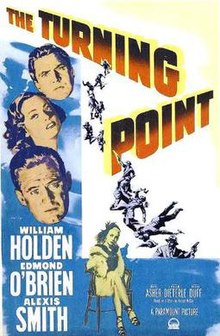
Crossfire is a 1947 American film noir drama film starring Robert Young, Robert Mitchum and Robert Ryan which deals with the theme of anti-Semitism, as did that year's Academy Award for Best Picture winner, Gentleman's Agreement. The film was directed by Edward Dmytryk and the screenplay was written by John Paxton, based on the 1945 novel The Brick Foxhole by screenwriter and director Richard Brooks. The film's supporting cast features Gloria Grahame and Sam Levene. The picture received five Oscar nominations, including Ryan for Best Supporting Actor and Gloria Grahame for Best Supporting Actress. It was the first B movie to receive a Best Picture nomination.

Crime fiction, detective story, murder mystery, mystery novel, and police novel are terms used to describe narratives that centre on criminal acts and especially on the investigation, either by an amateur or a professional detective, of a crime, often a murder. It is usually distinguished from mainstream fiction and other genres such as historical fiction or science fiction, but the boundaries are indistinct. Crime fiction has several subgenres, including detective fiction, courtroom drama, hard-boiled fiction, and legal thrillers. Most crime drama focuses on crime investigation and does not feature the courtroom. Suspense and mystery are key elements that are nearly ubiquitous to the genre.

D.O.A. is a 1950 American film noir directed by Rudolph Maté, starring Edmond O'Brien and Pamela Britton. It is considered a classic of the genre. A fatally poisoned man tries to find out who has poisoned him and why. It was the film debuts of Beverly Garland and Laurette Luez. In 2004, D.O.A. was selected for preservation in the United States National Film Registry by the Library of Congress as being "culturally, historically, or aesthetically significant."
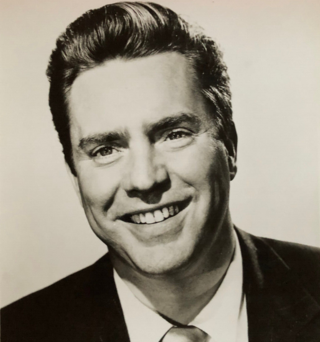
Eamon Joseph O'Brien was an American actor of stage, screen, and television, and film director. His career spanned almost 40 years, and he won one Academy Award, two Golden Globe Awards, and two stars on the Hollywood Walk of Fame.

William Boyett was an American actor best known for his roles in law enforcement dramas on television from the 1950s through the 1990s.

The Killers is a 1946 American film noir starring Burt Lancaster, Ava Gardner, Edmond O'Brien, and Sam Levene. Based in part on the 1927 short story of the same name by Ernest Hemingway, it focuses on an insurance detective's investigation into the execution by two professional killers of a former boxer who was unresistant to his own murder. Directed by Robert Siodmak, it featured an uncredited John Huston and Richard Brooks co-writing the screenplay, which was credited to Anthony Veiller. As in many film noir, it is mostly told in flashback.

The Big Clock is a 1948 American thriller directed by John Farrow and adapted by novelist-screenwriter Jonathan Latimer from the 1946 novel of the same title by Kenneth Fearing.

Somewhere in the Night is a 1946 American film noir psychological thriller film directed by Joseph L. Mankiewicz, written by Mankiewicz with Howard Dimsdale and Lee Strasberg based on a short story by Marvin Borowsky. It stars John Hodiak, Nancy Guild, Lloyd Nolan and Richard Conte.

Lady on a Train is a 1945 American light-hearted comedy crime film noir directed by Charles David and starring Deanna Durbin, Ralph Bellamy, and David Bruce.
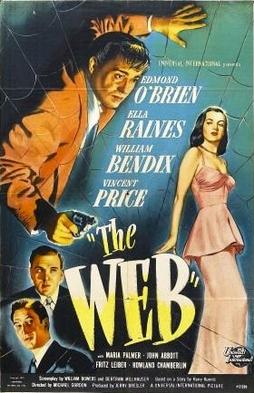
The Web is a 1947 American film noir crime film directed by Michael Gordon and starring Ella Raines, Edmond O'Brien, William Bendix and Vincent Price.

Frank Parish Conroy was a British film and stage actor who appeared in many films, notably Grand Hotel (1932), The Little Minister (1934) and The Ox-Bow Incident (1943).

The Canary Murder Case is a 1929 American Pre-Code crime-mystery film based on the 1927 novel of the same name by S.S. Van Dine. The film was directed by Malcolm St. Clair, with a screenplay by Wright, Albert Shelby LeVino, and Florence Ryerson. William Powell starred in the role of detective Philo Vance, with Louise Brooks co-starred as "The Canary"; Jean Arthur, James Hall, and Charles Lane also co-starred in other principal roles.

X Marks the Spot is a 1942 American film noir crime film directed by George Sherman and Damian O'Flynn, Helen Parrish, and Dick Purcell. It is a remake of the 1931 film of the same name.

Creature with the Atom Brain is a 1955 American zombie horror science fiction film directed by Edward L. Cahn and starring Richard Denning.

711 Ocean Drive is a 1950 American crime film noir directed by Joseph M. Newman and starring Edmond O'Brien, Joanne Dru and Otto Kruger.
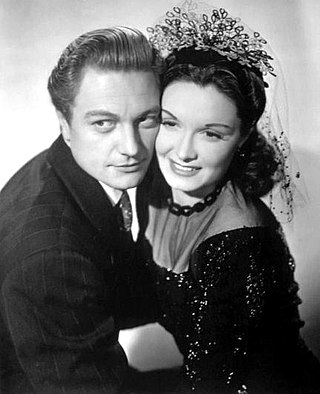
Quiet Please, Murder is a 1942 drama film directed by John Larkin and starring George Sanders, Gail Patrick and Richard Denning. Based on the short story Death Walks in Marble Halls by Lawrence G. Blochman that appeared in the September 1942 issue of American Magazine. It is also known under the title Death from the Sanskrit.
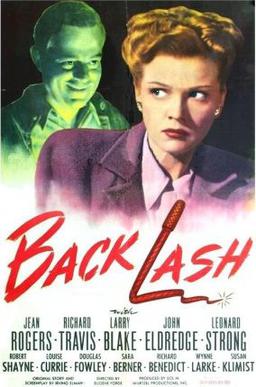
Backlash is a 1947 American crime film noir directed by Eugene Forde. The drama features Jean Rogers, Richard Travis, Larry Blake, John Eldredge and Leonard Strong.
Richard Travis was an American actor in films and television.

Justice League: Doom is a 2012 American animated superhero film, loosely based on "JLA: Tower of Babel", a 2000 comic book storyline by writer Mark Waid that ran in the DC Comics series JLA. The film's script was adapted by writer Dwayne McDuffie, and it is directed by Lauren Montgomery.

Shield for Murder is a 1954 American film noir crime film co-directed by and starring Edmond O'Brien as a police detective who has become malevolent. It was based on the novel of the same name by William P. McGivern.
